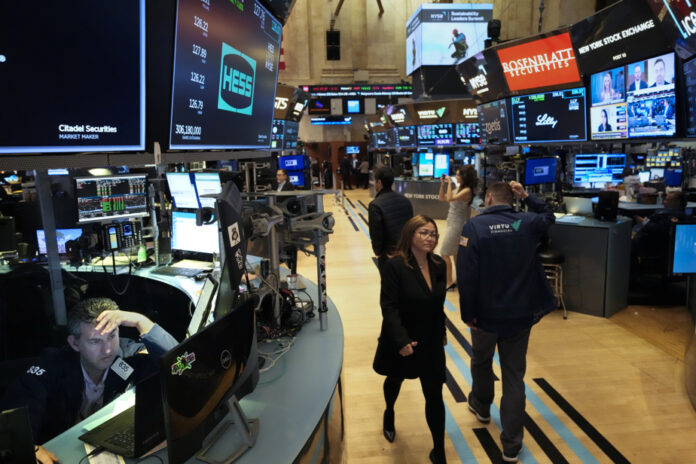(New York) New York Stock Exchange indexes ended mostly in the red on Wednesday amid recession fears and weak indicators.
While the Dow Jones index remained positive, climbing 0.24% to 33,482.72 points, the tech-heavy NASDAQ dropped 1.07% to 11,996.86 points and the broader S index
“The market ended in mixed fashion, investors are focused on recession and bond yields are falling,” commented Peter Cardillo of Spartan Capital Securities.
On the bond market, the rates on Treasury bills eased, materializing these fears of recession. Those at ten years fell to 3.29% against 3.33% the day before and those at two years fell back to 3.77% against 3.82% around 4 p.m. (Eastern time).
“Macro-economy news has weakened, especially job creations in the private sector” from the ADP survey, the analyst continued.
Hiring in the private sector came out for March at 145,000 against 205,000 expected and after 261,000 in February. This figure does not bode well for the official employment report which is expected on Friday and attests to the cooling of the labor market.
For Peter Cardillo, “much of the possibility of a recession is already priced into stock prices, but it is becoming more likely.”
” That
In addition to the ADP survey, the ISM barometer of activity in services in the United States was also disappointing.
The index slowed to 51.2% in March from 55.1% the month before and 54.3% forecast by analysts.
Activity in services, the leading sector of the American economy, thus remains, slightly, in expansion while that of the manufacturing sector, published on Monday, is already in recession at 46.3%.
Finally, the last indicator of the day, the US trade deficit widened for the wrong reasons, with both a decrease in exports, but also a decline in imports.
“The bottom line is that this decline in both exports and imports reflects a slowdown in global trade,” said Patrick O’Hare of Briefing.com.
In terms of values, Johnson and Johnson benefited (4.52%) from its decision to settle once and for all the lawsuits it has been facing for years concerning its talc.
The pharmaceutical giant has offered compensation of almost 9 billion dollars over several years, without admitting its guilt while its talc is accused of having caused ovarian cancer.
Express carrier FedEx was sought after (1.50%) after announcing a restructuring of its delivery methods and an increase in its dividend.
Walmart, the number one discount retailer (1.66%), reassured investors at an analyst conference, confirming its sales and growth targets.
On the downside, big tech names that led the market up at the end of the first quarter were subject to profit taking like Nvidia (-2.08%) and AMD (-3.45%). %) in semiconductors, but also Amazon (-2.74%), Apple (-1.13%) or Microsoft (-0.99%).
Alphabet (Google) fared better (-0.16%), especially after claiming that its microprocessor dedicated to artificial intelligence was more efficient than its competitor designed by Nvidia.
The regional bank Western Alliance, which plunged 19%, recovered a little (-12.38% at the close) after giving details on Wednesday, in a document filed with the SEC, on its balance sheet and the status of its deposits.















